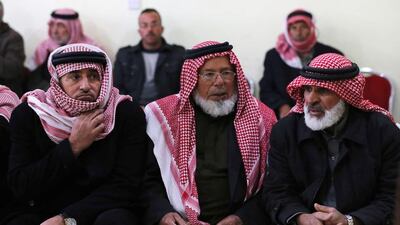Arabic News Digest
When Royal Jordanian Air Force pilot Maaz Al Kassasbeh, 26, was captured by ISIL after his F-16 crashed near the Syrian city of Raqqa, it was the first setback of its kind since Jordan joined the US-led coalition to fight the Islamist group.
ISIL has since made several demands on Jordan, mainly related to withdrawing from the coalition and releasing several prisoners.
Mohammed Hassan Al Tal, writing in the Jordanian daily Addustour, said Jordan was fully aware of the potentially steep costs that might follow its decision to join the international coalition against terrorism in Syria and Iraq.
“Nonetheless, the ultimate goal is greater: the protection of its national security, which is directly tied to that of its neighbours,” he wrote.
“It is normal for us to expect there will be costs associated with battle. Our pilots didn’t go to Syria and Iraq to promenade. They are aware that they are martyrs-in-waiting and that they face death every moment in the line of duty.”
But how will Jordan act in this situation? One of its pilots has been taken hostage by an organisation that has proven its blatant disregard for international laws and conventions, and that is known to stop at nothing in its attempt to undermine state institutions wherever it operates.
“This is the time for self-restraint. The enemy is watching our every move and reaction,” he added.
Dr Abdullah Al Suwaiji, writing in the Sharjah-based daily Al Khaleej, noted that ISIL doesn’t acknowledge UN conventions on prisoners. It isn’t moved by pleas for mercy from parents, doesn’t care if its prisoners are Muslim, and is an organisation that uses hostages to try to force governments to negotiate.
Five months ago, ISIL captured a group of Lebanese army officers after a heated battle and has been using them to pressure the Lebanese government into releasing Islamist prisoners. The government has remained unwavering and, as a result, five of the Lebanese officers have been brutally murdered.
Meanwhile, fearing the worst, the parents and families of the hostages have been putting pressure on their governments to comply with ISIL’s demands to ensure that their loved ones are released from captivity.
In Lebanon, parents resorted to blocking the streets and staging sit-ins to coerce the government to negotiate with the terrorists. In Jordan, the pilot’s father beseeched his son’s captors to spare his life.
“The parents’ reactions are justified. They have seen hundreds of captured soldiers executed by ISIL and they fear their children and loved ones will meet the same fate,” Dr Al Suwaiji wrote.
“But, there is another aspect to the situation. These terrified parents are trying to coerce their governments to acknowledge these terrorists as a legitimate entity that can be negotiated with and responded to if necessary.”
The Lebanese state has so far distanced itself from the Syrian crisis, but Jordan has openly joined the international coalition and its fighter jets have been raiding ISIL targets.
This makes the Jordanian pilot a primary enemy, who deserves to be killed, according to ISIL’s ideology.
“But ISIL isn’t in a haste to kill. It is taking advantage of the situation to make demands of the Jordanian government, which would probably agree to enter negotiations due to the presence of a strong Salafist and Jihadist movement in Jordan that would pressure the government to acquiesce to ISIL’s terms,” he added.
The case is complex. The question is: how will Jordan react if ISIL executes the captured pilot? Will it bite the bullet and continue to perform its role in the coalition?
“The coming days are crucial. Mobilisation of the Jordanian army, should it happen, would translate into significant changes in alliances and would precipitate ISIL’s downfall,” he concluded.
Translated by Racha Makarem
rmakarem@thenational.ae

